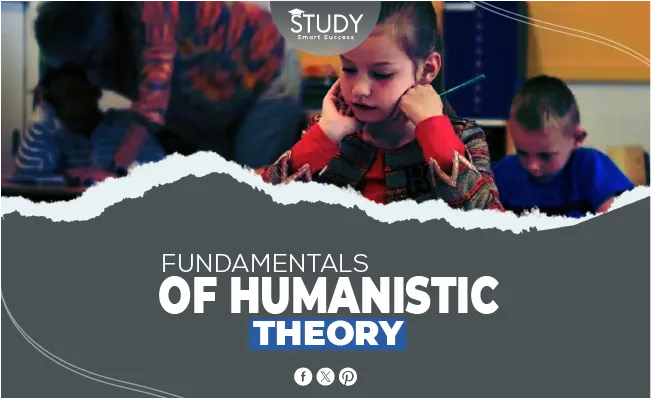Humanistic theory, which emphasizes human goodness and progress, stands out in psychological research. One of the most influential theories of human psychology, this mid-20th-century movement emphasizes personal progress, self-actualization, and human kindness. This piece unpacks humanistic theory, which will interest psychology fans and benefit students. Read about another theory of psychology called Behviorism.
The Roots of Humanistic Theory
Humanistic theory, sometimes called “Humanism,” grew out of disagreement with the fixed ideas of psychoanalysis and behaviorism that were popular in the early 1900s. Psychoanalysts studied how unconscious forces and childhood experiences affected people, while behaviorists looked at behaviors and didn’t always consider how those behaviors affected the person. On the other hand, humanistic theory puts the person’s experience at the center of studying psychology.
Key Figures in Humanistic Psychology
- Carl Rogers: Perhaps the most prominent humanistic psychologist, Rogers introduced the self and unconditional positive regard in therapy.
- Abraham Maslow: Maslow’s hierarchy of wants placed self-actualization at the top.
- Rollo May: May, a leading figure in existential-humanistic psychology, stressed anxiety as a condition of existence and the existential battle to find meaning.
- Fritz Perls: Gestalt therapy founder Perls’ holistic approach to the self-focused on awareness and the present, contributing to humanistic psychology.
- Virginia Satir: Satir’s family therapy focused on communication and emotional connection from a humanistic approach.
Core Principles of Humanistic Theory
Humanistic theory is built on several foundational principles:
- Inherent Goodness: People are considered suitable by nature and can grow.
- Holism: The idea focuses on the person as a whole instead of breaking them down into parts.
- Self-Actualization: One of the main ideas is that everyone should try to reach their full potential and skills.
- Free Will: Humanism believes people have free choice and control their destiny, unlike deterministic philosophies.
- Phenomenological Perspective: Personal viewpoint and conscious experience are essential to humanistic psychologists.
Applications of Humanistic Theory
Psychotherapy
Humanistic ideas have significantly impacted psychotherapy. For example, Rogerian (person-centered) treatment focuses on empathy, total positive respect, and therapeutic connection to help clients change.
Education
Humanistic ideas have also been used in schools to support a student-centered approach that emphasizes personal growth and self-esteem more than standard measures of success.
Organizational Development
The focus on self-actualization and personal growth has entered group development, encouraging a work setting that helps employees grow and be happy with their jobs.
Further Implications and Considerations
- Cultural Context: Western individualism and self-expression shape humanistic psychology. Evaluating how these ideals apply in other cultures is essential, where community and group aims may trump individual success.
- Technological Advancements: Digital technology and artificial intelligence provide new problems for humanistic psychology, particularly for self-actualization and interpersonal connections in a virtual environment.
- Mental Health and Wellness: The recent focus on mental health and well-being has been driven by humanistic concepts. Empathy, self-awareness, and personal development are crucial to tackling mental health issues today.
- Education and Learning: Beyond conventional education, humanistic ideas have been used for lifelong learning and adult education to promote intrinsic motivation and whole-person development.
- Sustainability and Environmental Concerns: Humanistic psychology’s focus on holistic well-being matches rising sustainability and environmental concerns. Exploring how humanistic concepts might promote ecological awareness and sustainability is crucial.
Challenges and Criticisms
Though influential, Humanistic Theory has criticisms. Some say its ideas are overly subjective and unsupported by proof. Others argue that the theory’s optimistic view of human nature ignores human complexity, including evil and destruction.
According to advocates, Humanistic Theory’s focus on human experience and subjectivity makes it unique and worthwhile. They encourage the theory’s qualitative techniques to capture the intricacies of human behavior and emotions, which quantitative methods frequently fail to do. Humanistic principles’ use in therapy and education shows their practicality in promoting personal development, mental wellness, and learning.
Criticism and support of Humanistic Theory reflect intellectual discussions about humans and how to investigate and encourage human flourishing. As it incorporates new scientific findings and addresses shortcomings, the theory remains an important aspect of psychology, providing a rich framework for understanding and developing the human spirit in a complicated environment.
The Enduring Legacy of Humanistic Theory
Even with these problems, Humanistic Theory has significantly impacted psychology, treatment, education, and many other fields. Its focus on each person’s growth and self-actualization has influenced many different areas, reminding us of the strength of the human spirit.
Humanistic theory’s ideas offer hope in a world that too often seems filled with negativity and cynicism by supporting the ability to change, grow, and connect with others in a good way.
For people interested in and studying psychology, knowing Humanistic Theory gives them a historical view of how psychological ideas have changed over time. It helps them see how people can be good and grow.
Humanistic thinking Theory, with its rich history and profound significance, inspires us to investigate human potential and personal improvement. Humanistic theory may help students, practitioners, and anybody interested in the human mind understand what it means to be human.
If you like this look into Humanistic Theory, you may be interested in additional psychological theories and their current applications. More entries that inspire interest and increase psychological knowledge are coming.
Conclusion
Finally, humanistic theory focuses on human development, innate goodness, and self-actualization, influencing psychology, education, therapy, and beyond. Its emphasis on individual experience and potential contrasts with deterministic or pathology-focused methods. Despite criticism of its scientific rigor and universal application, the theory’s main assumptions illuminate human drive and well-being. Humanistic psychology is engaging and hopeful in conversations about mental health and human potential because it believes everyone can learn and evolve. As we go ahead, merging humanistic concepts with new research and technology advances might improve education, therapy, and organizational development, maintaining the theory’s legacy of encouraging empathy and understanding.


